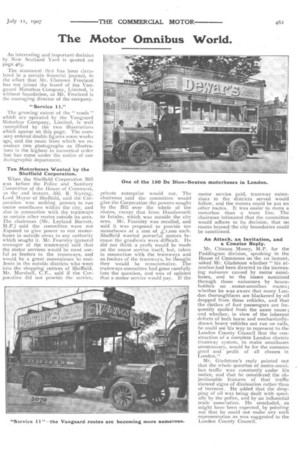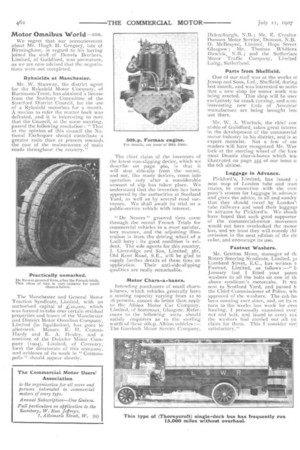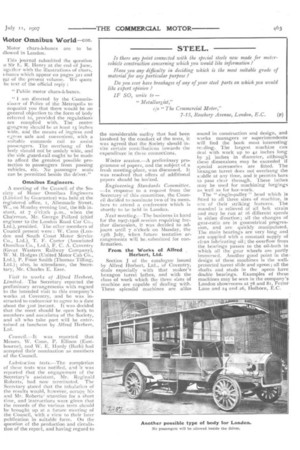The Motor Omnibus World.
Page 7

Page 8

Page 9

If you've noticed an error in this article please click here to report it so we can fix it.
An interesting and important decision by New Scotland Yard is quoted . on page 463.
The statement that has been circulated in a certain financial journal, to the effect that Mr. Clarence Freeland has not joined the board of the Vanguard Motorbus Company, Limited, is without foundation, as Mr. Freeland is Lhe managing director of the company.
"Service 11."
The growing extent of the " roads" which are operated by the Vanguard Motorbus Company, Limited, is well ?.xemplified by the two illustrations which appear on this page. The cornany entered double figures some weeks ago, and the route from which we reIroduce two photographs as illustra:ions is the highest in numerical order :hat has come under the notice of our thotographic department.
Ten Motorbuses Wanted by the Sheffield Corporation.
When the Sheffield Corporation Bill was before the Police and Sanitary Thrnmittee of the House of Commons, )n the 2nd instant, Aid. R. Styring, Lord Mayor of Sheffield, said the Corporation was seeking powers to run motor omnibuses within the city, and also in connection with the tramways an certain other routes outside its area. The chairman (Mr. Leyland Barratt, M.P.) said the committee were not disposed to give power to run motorbuses in outside areas to any authority which sought it. Mr. Fearnley (general manager of the tramways) said that the motor services would be most useful as feeders to the tramways, and would be a great convenience to residents in the outside districts who went into the shopping centres of Sheffield. Mr. Marshall, C.E., said if the Corporation did not provide the service,
private enterprise would not. The chairman said the committee would give the Corporation the powers sought by the Bill over the whole of the routes, except that from Handsworth to Intake, which was outside the city area. Mr. Fearnley was recalled, and said it was proposed to provide ten motorbuses at a cost of Li,000 each. Sheffield wanted powerful motors because the gradients were difficult. He did not think a profit would be made on the motor service itself, but, taken in connection with the tramways and as feeders of the tramways, he thought they would be remunerative. The tramways committee had gone carefully into the question, and was of opinion that a motor service would pay. If the motor service paid, tramway extensions to the districts served would follow, and the motors could be put on other routes. It was easier to move a motorbus than a tram line. The chairman intimated that the committee would adhere to its decision, that no routes beyond the city boundaries could be sanctioned.
An Attack, an Invitation, and a Concise Reply.
Mr. Chiozza Money, M.P. for the Paddington division, speaking in the House of Commons on the ist instant, asked Mr. Gladstone whether " his attention had been directed to the increasing nuisance caused by motor omnibuses, and to the losses sustained through those nuisances by householders on . motor-omnibus routes; whether he was aware that many London thoroughfares are blackened by oil dropped from these vehicles, and that the clothes of foot passengers are frequently spoiled from the same cause ; and whether, in view of the inherent defects of both horse and mechanicallydrawn heavy vehicles not run on rails, he could see his way to represent to the London County Council that the construction of a complete London electric tramway system, to make omnibuses unnecessary, would be for the common good and profit of all classes in London."
Mr. Gladstone's reply pointed out that the whole question of motor-omnibus traffic was constantly under his notice, and that he considered the objectionable features of that traffic showed signs of diminution rather than of increase. He added that the dropping of oil was being dealt with specially by the police, and by an influential trade association. He concluded, as might have been expected, by pointing out that he could not make any such representation as was suggested to the London County Council.
We regret that our announcement about Mr. Hugh H. Gregory, late of Birmingham, in regard to his having joined the staff of Dennis Brothers, Limited, of Guildford, was premature, as we are now advised that the negotiations were not completed.
Ryknields at Manchester.
Mr. W. Stanway, the district agent for the Ryknield Motor Company, of Burton-on-Trent, has obtained a license from the Sanitary Committee of the Stretford District Council, for the use of a Ryknield motorbus for a month. A motion to refer the matter back was defeated, and it is interesting to note. that the .Council, at the same meeting, passed the following resolution : " That in the opinion of this council the National Exchequer should contribute a greater ratio than at present towards the cost of the maintenance of main roads throughout the country."
The Manchester and General Motor Traction Syndicate, Limited, with an authorised capital Of £io,000, which was formed to take over certain residual properties and leases of the Manchester and District Motor Omnibus Company, Limited (in liquidation), has gone to allotment. Messrs. E. IT. Cozensliardv and E. A. Healey, and a nominee of the Daimler Motor Company ('934), Limited, of Coventry, form the directorate of this company, and evidence of its work in " Cottonopolis " should .appear shortly.
The chief claim of the inventors of the latest non-slipping device, which we describe on page 460, is that it will stop side-slip from the outset, and not, like many devices, come into operation only after a considerable amount of slip has taken place. We understand that the invention has been approved by the authorities at Scotland Yard, as well as by several road surveyors. We shall await its trial on a public-service vehicle: with interest.
" De Nevers " grooved tires came through the recent French Trials for commercial vehicles in a most satisfactory manner, and the adjoining illustration is from the driving wheel of a Latil lorry : its good condition is evident. The sole agents for this country, J. Liversidge and Son, Limited, 561, Old Kent Road, SE., will be glad to supply further details of these tires on application. Their anti-side-slipping qualities are really remarkable.
Motor Chars-a-bancs.
Intending purchasers of small charsii-bancs, which vehicles generally have a seating capacity varying from 12 to 16 persons, cannot do better than apply to the Albion Motor Car Company, Limited, of Scotstoun, Glasgow. References to the following users should satisfy enquirers as to the sterling worth of these 16h.p. Albion vehicles :The Gareloch Motor Service Company, Helensburgh, NB; Mr. E. Crosher Dunoon Motor Service, Donoon, N.B. D. McBrayne, Limited, Hope Street Glasgow ; Mr. Thomas Whiliens Hawick, N.B. ; and the Sutherlanc Motor Traffic Company, Limited Lairg, Sutherland.
Parts from Sheffield.
One of our staff was at the works ol Jessop and Sons, Ltd., Sheffield, during last month, and was interested to natio that a new shop for motor work ww being erected. This shop will be used exclusively for crank turning, and sam interesting new tools of Americar manufacture are being brought bite use there.
Mr. W. A. Worlack, the chief con stable of Guildford, takes great interes in the development of the commercial motor industry in his district, and is ar expert motorist. Not a few of out readers will have recognised Mr. Wor lock at the steering wheel of the fore most Dennis char-à-bancs which wa! illustrated on page 355 of our issue o the 6th ultimo.
Luggage in Advance.
Bickford's, Limited, has issued ; neat map of London tube and trao routes, in connection with the coin pany's system for luggage in advance and gives the advice, to all and sundry that they should travel by London'c tube railways and send their luggag■ in advance by Bickford's. We shoule have hoped that such good supporter of the commercial-motor movemen would not have overlooked the motor bus, and we trust they will remedy thi omission in the next edition of the cir cular, and encourage its use.
Fastnut Washers.
Mr. Gretton Mynn, manager of th Rotary Steering Syndicate, Limited, 31 Lombard Street, E.C., has written t Fastnut, Limited, as follows :—" II January last I fitted your paten washers to all the bolts on one of th above syndicate's motorcabs. It .wa sent to Scotland Yard, and passed b: the Chief Commissioner of Police, whl approved of the washers. The cab ha been running ever since, and, on its re turn to the works last week for °vet hauling, I personally examined ever] nut and bolt, and found in every cat the washers had carried out all yo. claim for them. This I consider ver: satisfactory."
Motor chars-h-bancs are to be illowed in London.
This journal submitted the question :o Sir L. R. Henry at the end of June, :0g-ether with the illustrations of chars_ 1.-bancs which appear on pages 321 and 192 of the present volume. We quote he text of the official reply :
" Public motor chars-a-bancs.
" I am directed by the Commissioner of Police of the Metropolis to acquaint you that there would be no general objection to the form of body referred to, provided the regulations are complied with. The centre gangway should be at least 15 inches wide, and the means of ingress mid egress safe and convenient, with a suitable commode rail to assist passengers. The overhang of the body should not be unduly wide, and the side guard-rail ought to be made to afford the greatest possible protection to passengers from passing vehicles, etc. No passenger seats can be permitted beside the driver."
Omnibus Engineers.
A meeting of the Council of the Society of Motor Omnibus Engineers (Limited by Guarantee) was held at the registered office, t, Albemarle Street, W., on Monday evening last, the 8th instant, at 7 o'clock p.m., when the Chairman, Mr. George Pollard (chief engineer to the London Road Car Co., Ltd.), presided. The other members of Council present were : W. Cann (London and South Coast Motor Service Co., Ltd.), T. E. Carter (Associated Omnibus Co., Ltd.), F. C. A. Coventry (Great Western Railway Company), W. M. Hodges (United Motor Cab Co., Ltd.), P. Frost Smith (Thomas Tilling, Ltd.); also, in attendance, the Secretary, Mr. Charles E. Esse.
Visit to works of Alfred Herbert, Limited.The Secretary reported the preliminary arrangements with regard to the intended visit to this company's works at Coventry, and he was instructed to endeavour to agree to a date about the 3 ist instant. It was decided that the meet should be open both to members and associates of the Society, and all who take part will be entertained at luncheon by Alfred Herbert, Ltd.
ConeCil.—It was reported that Messrs. W. Cann, P. Ellison (Eastbourne), and W. E. Hardy (Bath) had accepted their nomination as members of the Council.
Ltlbricaion tests.--The completion of these tests was notified, and it was reported that the engagement of the Secretary's assistant, Mr. Reginald Roberts, had now terminated. The Secretary stated that the tabulation of the results would, however, occupy his and Mr. Roberts' 'attention for a short time, and instructions were given that the records of the various tests should be brought up at a future meeting of the Council, with a view to their later publication in suitable form. On the question of the production and circulation of the report, and having regard to
the considerable outlay that had been involved by the conduct of the tests, it was agreed that the Society should invite certain contributions towards the expenditure in these connections.
Winter session.—A preliminary programme of papers, and the subject of a fresh meeting-place, was discussed. It was resolved that offers of additional papers should be invited.
Engineering Standards Committee. —In response to a request from the Secretary of this committee, the Council decided to nominate two of its members to attend a conference which is shortly to be held in London.
Next meeting.—The business in hand for the 1907-1908 session requiring further discussion, it was decided to adjourn until 7 o'clock on Monday, the t5th July, when future tentative arrangements will he., submitted for confirmation.
From the Works of Alfred , Herbert, Ltd.
Section J of the catalogue issued by Alfred Herbert, Ltd., of Coventry, deals especially with that maker's hexagon turret lathes, and with the class of work which the three sizes of machine are capable of dealing with. These splendid machines are alike sound in construction and design, and works managers or superintendents will find the book most interesting reeding. The largest machine can deal with work up to 42 inches long by Ainches in diameter, although these dimensions may be exceeded if special accessories are fitted. The hexagon turret does not overhang the saddle at any time, and it permits bars to pass clear through. These lathes may be used for machining forgings
as well as for bar-work. • The " single-pulley " head which is fitted to all three sizes of machine, is one of their striking features. The mandrel is relieved of all belt strain and may be run at 16 different speeds in either direction ; all the .changes of gear-ratio are in geometrical progression, and are quickly manipulated. The main bearings are very long and are supplied with a constant supply of clean lubricating oil; the overflow from the bearings passes to the oil-bath in which all the gear wheels are partly immersed. Another good point in the. design of these machines is the wellprotected turret slide and apron ; all the shafts and studs in the apron have _ double bearings. Exampks of these machines may be seen in the company's London showrooms at 78 and 81, Fetter Lane and 24 and 26, Holborn, E.C.






















